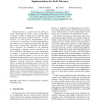Free Online Productivity Tools
i2Speak
i2Symbol
i2OCR
iTex2Img
iWeb2Print
iWeb2Shot
i2Type
iPdf2Split
iPdf2Merge
i2Bopomofo
i2Arabic
i2Style
i2Image
i2PDF
iLatex2Rtf
Sci2ools
IPPS
2005
IEEE
2005
IEEE
Current Practice and a Direction Forward in Checkpoint/Restart Implementations for Fault Tolerance
Checkpoint/restart is a general idea for which particular implementations enable various functionalities in computer systems, including process migration, gang scheduling, hibernation, and fault tolerance. For fault tolerance, in current practice, implementations can be at user-level or system-level. User-level implementations are relatively easy to implement and portable, but suffer from a lack of transparency, flexibility, and efficiency, and in particular are unsuitable for the autonomic (self-managing) computing systems envisioned as the next revolutionary development in system management. In contrast, a system-level implementation can exhibit all of these desirable features, at the cost of a more sophisticated implementation, and is seen as an essential mechanism for the next generation of fault tolerant—and ultimately autonomic—large-scale computing systems. Linux is becoming the operating system of choice for the largest-scale machines, but development of system-level che...
Distributed And Parallel Computing | Extant Implementations | Fault Tolerance | IPPS 2005 | User-level Implementations |
| Added | 25 Jun 2010 |
| Updated | 25 Jun 2010 |
| Type | Conference |
| Year | 2005 |
| Where | IPPS |
| Authors | José Carlos Sancho, Fabrizio Petrini, Kei Davis, Roberto Gioiosa, Song Jiang |
Comments (0)

